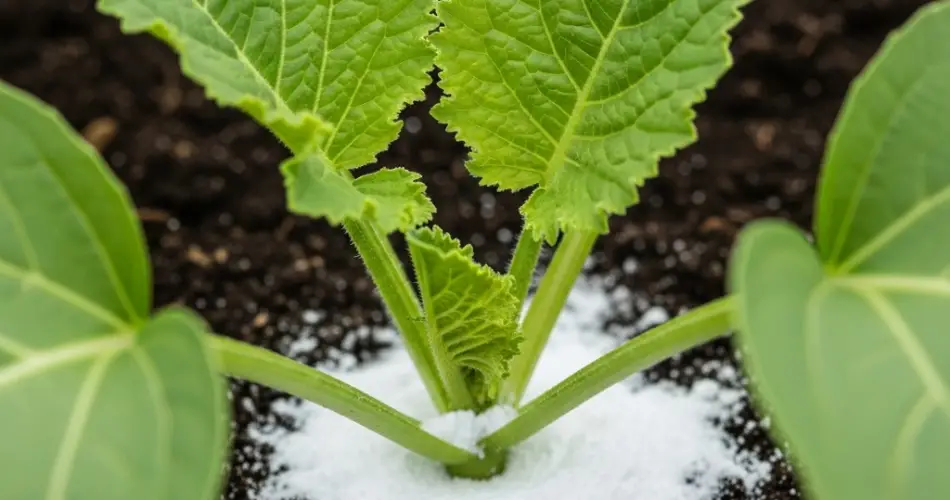Baking soda, or sodium bicarbonate, is a staple in most kitchens. It’s known for its versatility in cooking, cleaning, and even deodorizing. Over the years, it has also gained popularity as a natural remedy in gardening. Gardeners often tout its ability to control pests, prevent fungal diseases, and even improve soil conditions. But how safe is it really to use baking soda in the garden? Let’s explore its uses, benefits, and potential risks so you can make an informed decision.
The Benefits of Baking Soda in the Garden
There are several ways baking soda can be useful in the garden. Here are some of the most common applications:
1. Fungal Disease Control
Baking soda is most often used to combat fungal diseases like powdery mildew, black spot, and early blight, especially on tomatoes, cucumbers, and squash. When mixed with water and sprayed on plant leaves, baking soda alters the pH on the leaf surface, making it less hospitable for fungal spores to survive and spread.
How to use it:
Mix 1 teaspoon of baking soda with 1 liter of water. You can add a few drops of mild liquid soap to help the solution adhere to leaves. Apply once a week during dry weather conditions.
2. Pest Deterrent
Some gardeners claim that baking soda can repel pests such as ants, aphids, and even cabbage worms. While results vary, it may help when used in combination with other natural pest control methods.
3. Weed Control
Sprinkling baking soda into the cracks of sidewalks, patios, or between paving stones can inhibit weed growth. It’s especially effective on small, young weeds before they become established.
4. Soil pH Testing
Baking soda can also be used to perform a basic DIY soil pH test. When combined with vinegar and soil samples, it can give a rough indication of whether your soil is acidic or alkaline.
But Is It Really Harmless?
Despite its natural and non-toxic reputation, baking soda isn’t completely harmless when used in the garden. Here’s why:
1. High Sodium Content
Baking soda contains sodium, which can accumulate in the soil over time. Sodium can disrupt soil structure, reduce water penetration, and harm beneficial microorganisms. In high concentrations, it can also cause “salt stress” in plants, leading to leaf burn or stunted growth.
2. Altering Soil pH
While a small change in pH can help control fungal diseases, excessive use of baking soda may raise the pH of the soil or leaf surface too much. Most garden plants prefer slightly acidic to neutral soil. Making the soil too alkaline can interfere with nutrient absorption and lead to deficiencies.
3. Potential Plant Damage
Some sensitive plants, especially those with tender foliage, may be harmed by baking soda sprays. Damage can appear as browning or scorched leaves. Always test any homemade spray on a small section of the plant before applying it more broadly.
Guidelines for Safe Use
To use baking soda safely and effectively in your garden, consider the following tips:
-
Use it sparingly: Baking soda is best used as a spot treatment, not a regular garden additive.
-
Apply only when needed: Use it to treat specific issues like powdery mildew, not as a preventative without signs of disease.
-
Avoid root zones: If using baking soda in a spray, try to keep it off the soil and direct it onto affected leaves.
-
Test before wide use: Always apply a small amount to part of a plant and wait 24 hours to see how it reacts.
Alternative Natural Solutions
If you’re concerned about the potential side effects of baking soda, consider these safer alternatives:
-
Neem oil: An organic pest and fungus control option that’s biodegradable and gentle on plants.
-
Compost tea: Boosts beneficial microbes and supports plant immunity.
-
Milk spray: A time-tested remedy for powdery mildew, made with a 1:10 milk-to-water ratio.
-
Garlic or chili sprays: Natural repellents for many soft-bodied pests.
Conclusion
Baking soda can be a helpful tool in the gardener’s toolkit — particularly for managing certain fungal diseases and small pests. However, it is not without its risks. Overuse can negatively affect soil quality, plant health, and the balance of beneficial organisms. Like any garden remedy, it’s important to use it wisely, cautiously, and only when necessary.
By understanding how baking soda works and its potential side effects, you can decide whether it fits into your natural gardening practices. When used in moderation and combined with other organic techniques, it can offer benefits without doing harm.



